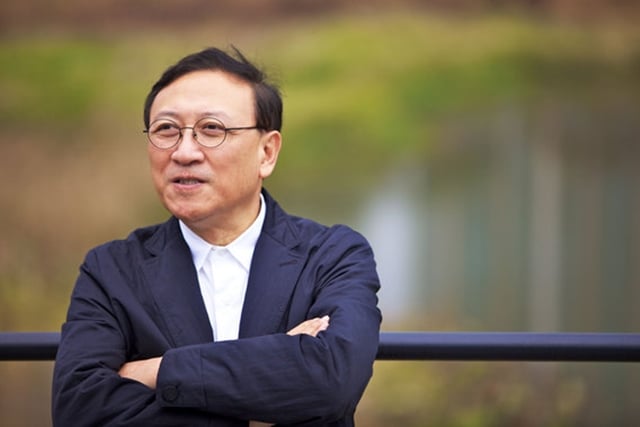Art & Exhibitions
Gwangju Biennale President Resigns Over Censorship
Artists call for return of a painting satirizing Korea's president.

Photo: Courtesy Gwangju Biennale Foundation.
Artists call for return of a painting satirizing Korea's president.

Benjamin Sutton

The president of the Gwangju Biennale Foundation, Lee Yong-woo, has resigned over the censorship of a painting included in the Gwangju Bienniale‘s 20th anniversary exhibition, “Sweet Dew—After 1980,” at the Gwangju Museum of Art. The offending artwork, a 32-foot-wide painting by Hong Seong-dam titled Sewol Owol, portrays Korean president Park Geun-hye as a maniacal scarecrow facing off against angered parents of children who died in the sinking of the MV Sewol ferry in April, a national tragedy that has had huge political repercussions.
“I am taking full responsibility for what happened regarding the special exhibit that celebrates the 20th anniversary of the Gwangju Biennale,” Lee said at an August 18 press conference. “From an art critic’s point of view, the painting should be on exhibit. I don’t think it is taboo to satirize a country’s president…Freedom of artistic expression should not be restricted by the government just because they have the exhibition budget under their control.” Lee, who co-founded the Gwangju Biennale in 1995, was its artistic director in 2004 and has been its president since 2012.
In the painting, Park is being held back by former president Park Chung-hee (her late father), and her chief of staff Kim Ki-choon, the Wall Street Journal explains. The Biennale Foundation initially claimed that the work’s exclusion from the exhibition had nothing to do with politics and was purely logistical—Hong simply submitted the work late. But it was later revealed that the decision to withhold the painting from the 20th anniversary exhibition was in fact prompted by the city of Gwangju, which sponsors the exhibition to the tune of $2.4 million for this year’s Biennale. The city government had asked that Hong change the painting, according to the Gwangju Biennale’s official statement on Lee’s resignation.
In response to the censorship of Hong’s work, other artists featured in “Sweet Dew” have removed their works from the exhibition and its curator, Yun Beom-mo, has resigned.
“The decision not to exhibit Sewol May was made in the absence of the chief curator, who had announced his intent to resign and left the meeting room,” Yun added. “Guaranteeing artists’ freedom of expression and the ‘Gwangju spirit’ can’t be separated.”
“I thought it wouldn’t be good for an artist to simply do nothing. It’s shameful, you know?,” artist Lee Yun-yop, who removed his work on August 11, told the Hankyoreh. “If they won’t put up Hong Sung-dam’s work, what does that make the rest of us artists? Did we pass the censors?”
The international art community has taken notice. The director of Japan’s Sakima Art Museum, which is loaning a Kathe Kollwitz piece to the Biennale—slated to open September 5—wrote a letter to the Biennale Foundation urging it to include Hong’s work in the Gwangju Museum of Art exhibition (which is a separate initiative, organized to mark the anniversary of Asia’s most prominent biennial), and threatening to withhold the Kollwitz work if it does not. “We strongly request the Gwangju Biennale display the painting of artist Hong Seong-dam and respect the purpose of the exhibition,” the letter states. “Otherwise we don’t see a reason to participate in an exhibition that is losing its founding purpose.”